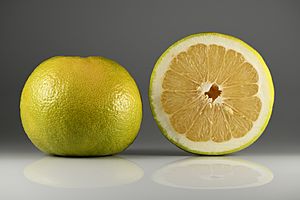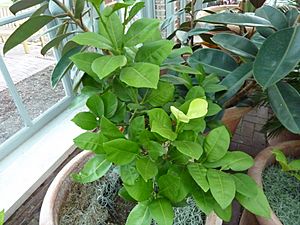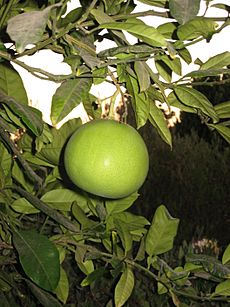Oroblanco facts for kids
Quick facts for kids  |
|
| Hybrid parentage | Citrus grandis × C. Paradisi/Citrus maxima/Citrus grandis |
|---|---|
| Cultivar | Oroblanco |
| Origin | University of California, Riverside |
An oroblanco, oro blanco (white gold), Pomelit (Israel) or sweetie (Citrus grandis Osbeck × C. Paradisi Macf.) is a sweet seedless citrus hybrid fruit similar to grapefruit. It is often referred to as oroblanco grapefruit.
Development
Oroblanco was developed as a cross between a diploid acidless pomelo and a seedy white tetraploid grapefruit, resulting in a triploid seedless fruit that is less acidic and less bitter than the grapefruit.
The oroblanco was patented by the University of California in 1981 after its development by Robert Soost and James W. Cameron at that university's citrus experiment station in Riverside, California. The nine-year project began in 1958 and led to a series of test plantings before a successful variation was refined.
Description

Oroblancos are either round- or oval-shaped with a thicker rind than grapefruit. When eaten, an oroblanco lacks bitterness associated with grapefruits and is rather sweet, even when the outer peel is still green, but the white membranes separating the fleshy segments are bitter and usually discarded.
Oroblancos are available from September through December. They may be peeled and eaten like an orange — by separating into segments — and are often eaten at breakfast.
A similar fruit has been commonly cultivated in Israel since 1984, from where the name "Sweetie" originated. It is also referred to as a "pomelit."
Gallery




